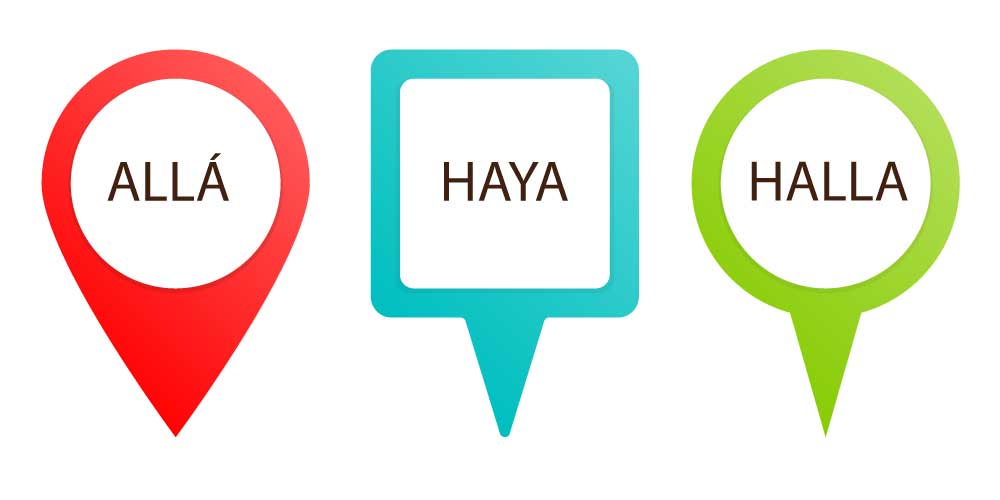Diferencias entre «allá», «haya», «halla»
«Allá», «haya», «halla», seguramente has oído estas palabras que tienen significados completamente diferentes. En esta lección te explicamos las diferencias.

De estas tres palabras, “allá” es la más fácil de distinguir, por su grafía que lleva una tilde, y su pronunciación aguda. Sin embargo, “halla” y “haya”, son palabras que la mayoría de hispanohablantes pronuncian igual.
Vamos a conocer estas tres palabras un poco mejor.
“HALLA”
Es una forma del verbo «hallar”, que significa encontrar a alguien o algo. Descubrir una verdad o entender una cosa después de pensar y reflexionar sobre ella.
Equivale a la tercera persona de singular del presente indicativo y a la segunda persona de singular del modo imperativo.
El verbo “hallar” también se puede encontrar muchas veces en su forma reflexiva “hallarse” (equivalente a encontrarse).
Presente de indicativo
(yo) hallo
(tú) hallas
(él) halla
(nosotros) hallamos
(vosotros) halláis
(ellos) hallan
Imperativo
(tú) halla
(él / ella )halle
(nosotros) hallemos
(vosotros) hallad
(ellos) hallen
Ejemplos:
Ella siempre halla la manera de escaparse de los problemas / Ella siempre encuentra la manera de escaparse de los problemas.
Me hallo en medio de un bosque muy especial / Me encuentro en medio de un bosque muy especial.
“HAYA”
Ahora se trata de una forma de la conjugación del verbo “haber”. La primera y la tercera persona del presente de subjuntivo. Y sus principal función es aparecer como auxiliar en tiempos compuestos.
Presente de subjuntivo
(yo) haya
(tú) hayas
(él) haya
(nosotros) hayamos
(vosotros) hayáis
(ellos) hayan
Ejemplos:
No creo que haya víctimas en el accidente.
Cuando haya comido iré a verte.
Cuando hayas visitado a tu madre me avisas.
Cuando hayas terminado el trabajo tienes que ir a comprar.
Explíquenos lo que haya visto.
Que haya paz en el mundo.
Como último apunte, “haya” puede referirse a un nombre de árbol.
Me gusta mucho el haya de tu jardín.
“ALLÁ”
Es un adverbio de lugar y se emplea para indicar un lugar que está alejado de nuestra posición. Al llevar una tilde en su forma escrita y pronunciarse de manera aguda, no es complicado distinguir la palabra “allá” en una frase.
Ejemplos:
Allá está la casa de mis hermanos.
¿Aquello de allá es un ciervo?
Ejercicios
[h5p id=»4″]
¿Quieres saber tu nivel de español?
¿Qué opinan nuestros alumnos de nuestros cursos de español?
Estas son algunas de las opiniones de nuestros alumnos. ¡Los premios nos los dais vosotros!





